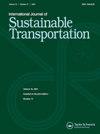Determinants and effects of climate finance in the transport sector
IF 3.1
3区 工程技术
Q2 ENVIRONMENTAL STUDIES
International Journal of Sustainable Transportation
Pub Date : 2024-11-04
DOI:10.1080/15568318.2024.2421842
引用次数: 0
Abstract
We examine the determinants of climate-related development finance flows to the transportation sector and their relationship with CO2 emission levels. The mitigation fund allocation is particularly correlated with the demographic characteristics of recipient countries; however, the correlation with per capita income and emissions seems to be weak. In contrast, equity considerations appear to be the main determinants of adaptation fund allocation. Finally, we find some evidence of a significant negative relationship between mitigation investments and emissions per capita and while the overall effect is modest, it tends to be most marked in countries with the highest per capita emissions. Thus, the fact that countries with the highest emissions per capita are not receiving relatively more investments may be hampering the effectiveness of climate finance.
运输部门气候融资的决定因素和影响
我们研究了气候相关发展资金流向交通部门的决定因素及其与二氧化碳排放水平的关系。缓解基金的分配特别与受援国的人口特征相关;然而,与人均收入和排放量的相关性似乎很弱。相比之下,公平考虑似乎是适应基金分配的主要决定因素。最后,我们发现一些证据表明,缓解投资与人均排放量之间存在显著的负相关关系,虽然总体影响不大,但在人均排放量最高的国家,这种影响往往最为明显。因此,人均排放量最高的国家没有获得相对更多的投资,这一事实可能会阻碍气候融资的有效性。
本文章由计算机程序翻译,如有差异,请以英文原文为准。
求助全文
约1分钟内获得全文
求助全文
来源期刊
CiteScore
8.90
自引率
2.60%
发文量
56
期刊介绍:
The International Journal of Sustainable Transportation provides a discussion forum for the exchange of new and innovative ideas on sustainable transportation research in the context of environmental, economical, social, and engineering aspects, as well as current and future interactions of transportation systems and other urban subsystems. The scope includes the examination of overall sustainability of any transportation system, including its infrastructure, vehicle, operation, and maintenance; the integration of social science disciplines, engineering, and information technology with transportation; the understanding of the comparative aspects of different transportation systems from a global perspective; qualitative and quantitative transportation studies; and case studies, surveys, and expository papers in an international or local context. Equal emphasis is placed on the problems of sustainable transportation that are associated with passenger and freight transportation modes in both industrialized and non-industrialized areas. All submitted manuscripts are subject to initial evaluation by the Editors and, if found suitable for further consideration, to peer review by independent, anonymous expert reviewers. All peer review is single-blind. Submissions are made online via ScholarOne Manuscripts.

 求助内容:
求助内容: 应助结果提醒方式:
应助结果提醒方式:


